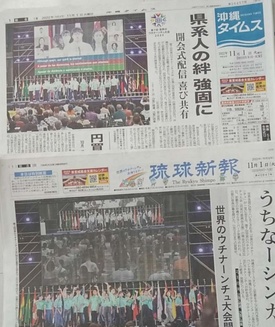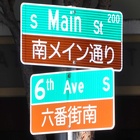A symbol of Okinawa's individuality
The 7th World Uchinanchu Festival (organized by the Okinawa Prefectural Government Executive Committee) was held from October 30th to November 3rd in various parts of Okinawa, mainly in Naha City, bringing together people from all over the world with roots in Okinawa, and beautifully demonstrated the uniqueness of "Okinawa connected to the world" within Japan.
"Uchinanchu" means "Okinawan people" in the Okinawan language. In other words, this conference aims to bring together Okinawans scattered around the world in their home prefecture, not their home country, to deepen exchanges with Okinawans and to maintain and develop a network centered on Okinawa, the Uchina Network.
The executive committee is made up of the prefecture and private organizations involved in the economy, finance, media, international exchange, and culture, making it a major event involving the entire Okinawa prefecture.
Okinawa, like Hiroshima and Kumamoto, is known as a prefecture that has produced many immigrants. Its history began with immigration to Hawaii in 1900, and people continued to migrate to North and South America before and after the war. Today, it is estimated that there are approximately 420,000 immigrants from Okinawa and their descendants (Okinawan descent) living overseas (estimated figure for fiscal 2016, Okinawa Prefecture Exchange Promotion Division).
The breakdown is about 250,000 in South America, including Brazil, Peru, Argentina, and Bolivia, about 100,000 in North America, including the United States, and the rest are spread across the world, including Europe, China, Australia, etc. However, if you conduct a survey in other prefectures that produce a large number of immigrants, you will find that a similarly large number of "prefecture-descent people" are spread around the world.
It would be nice to have a "Worldwide Convention for People from a Prefecture Like You," but in reality, Okinawa Prefecture is the only prefecture that has a convention of this scale. However, a "Convention for Japanese People Abroad" is held almost every year in Tokyo, organized by the Association of Japanese Abroad, a public interest incorporated foundation. This year, the 62nd convention was held in October, and a talk event was also held in conjunction with the event, "What is a Nikkei? Asking the new generation of Japanese."
The Association of Japanese Abroad has a long history. After the war, when the people were in poverty, food, clothing and other relief supplies were sent to Japan through the efforts of Japanese and Japanese-Americans living in the United States. In response to this, a call was raised among members of the Diet to hold a welcoming ceremony to "comfort the hardships of Japanese and Japanese-Americans living in the United States and to express gratitude for their brotherly love," and in 1957 the "Japanese Abroad Friendship Conference to Commemorate Japan's Accession to the United Nations" was held, which became the Japanese Abroad Convention the following year and has continued to this day. The Association of Japanese Abroad also served as the secretariat for this event.
The association defines "overseas Japanese people" as "Japanese people who have moved their base from Japan to overseas and are living there with the intention of settling there permanently, as well as their second, third, fourth generation descendants, regardless of nationality or race."
According to the association, the number of Nikkei people in the world, including North and South America, is estimated to be about 4 million this year. As there are about 420,000 Uchinanchu in the world, the rest are people with roots in other prefectures. However, to repeat, Okinawa Prefecture is the only prefecture that is holding what could be called a world prefectural convention.
It can be surmised that this is an Okinawan characteristic. Perhaps people of Okinawan descent have a stronger sense of identity with their Okinawan roots than people with roots in other prefectures. This is likely related to the strength of Okinawa's individuality. For example, Okinawa's food culture and musical culture, symbolized by the sanshin, are overwhelmingly unique and not found anywhere else, and perhaps being aware of one's connection to these cultures strengthens one's identity as someone of Okinawan descent.
The rise of Chanpuru culture
The first Worldwide Uchinanchu Festival was held in 1990, and has been held roughly once every five years since then. The number of participants increased from 2,400 at the first festival to 7,300 at the sixth festival in 2016, and the scale of the festival has grown. At that time, it was decided to designate October 30 as "Worldwide Uchinanchu Day."
The 7th tournament was originally scheduled to be held last year, but was postponed for a year due to the impact of the COVID-19 pandemic. Also, entry restrictions were in place until just before the event, so some people decided not to attend, and 2,345 people were scheduled to participate, with 6,176 people from across the country, including from within the prefecture, taking part.
There were many events during the opening ceremony. Starting with the eve of the festival, various stages were set up for cultural and traditional performing arts, a symposium on international exchange and peace was held, and tourism-related events were also held. These events were reported daily in local newspapers such as the Ryukyu Shimpo and the Okinawa Times.
The following article in the Okinawa Times on the day of the tournament gives an indication of the excitement surrounding the event.
"The Governor of Hawaii also makes a 'homecoming' to Okinawa"
Okinawans from around the world arrive at Naha Airport one after another, Uchinanchu Festival begins today
On the 29th, the day before the opening of the 7th Worldwide Uchinanchu Festival, the number of participants arriving in Okinawa reached its peak. About 800 people, the largest number of participants from Hawaii, were scheduled to come to Okinawa, and about 200 people arrived at Naha Airport on a charter flight at around 3:00 pm that day. A welcoming ceremony was held at YUINICHI Square in the airport, where they were given a grand welcome by relatives living in Okinawa Prefecture and people involved in the festival. David Jones, president of the Hawaii Okinawa Association, said in his greeting, "Thank you for the warm welcome. As someone with roots in Okinawa, I am proud of this."
Governor David Ige of Hawaii, a third-generation Okinawan, also came to Okinawa on the same day to participate in the tournament. He was greeted by Governor Denny Tamaki and others at Naha Airport. Governor Ige said, "This is the first time I've participated with my children. I'm really looking forward to the various events at the Uchinanchu Tournament." Governor Tamaki welcomed him, saying, "I hope you all have a wonderful time with your families." (Social Affairs Department, Fukuhara Akane)
One song for the whole world
On the eve of the festival, a parade was held in Naha City with about 3,000 people participating, wearing national costumes from various countries and carrying national flags and banners, and others marched about 1 kilometer. Locals along the route shouted "Menso-re (welcome)" and "Welcome back!". It was a truly champuru scene, with a mix of Eisa, Sanshin, Samba and Hula dancing.
The closing ceremony was a festival-like event, with many professional musicians making an appearance. The venue was heated up with the appearance of Diamantes, a group led by third-generation Peruvian Shiroma Alberto. The final performance was by BEGIN, originally from Ishigaki Island, who performed with a sound that exuded the scent of Okinawa.
The event was streamed on the Internet and was delivered to many Okinawan fans overseas. Among the scenes was a performance of the Okinawan folk song "Asatoya Yunta" by Okinawan people from all over the world. The scene of singing one song all over the world seemed to symbolize the purpose of the event.
Some of the people who came from overseas were surprised by the scale of the event and felt a strong sense of unity. Some also used the event as an opportunity to search for their own roots in Okinawa.
Masayuki Fukazawa, editor-in-chief of the Brazil Nippo newspaper, who visited from Brazil for an interview, introduced the example of a Japanese woman from São Paulo who visited the prefectural library while in Okinawa and was able to confirm her roots using a database. He wrote the following:
"I truly feel that the magic of this event is that such special reactions of 'identity awakening' are occurring all over the place. It is not just an international exchange event, but for those of Okinawan descent, it is a journey of self-discovery." (Reporter's column, November 8th)
This tournament has many different meanings, but from a broader perspective, it is an opportunity for Okinawans all over the world to interact with other Japanese people and with Japanese people, and from this, they can naturally learn about international mutual understanding and diverse ways of looking at things. In that sense, we should pay more attention to the World Uchinanchu Festival in the future as an event for all of Japan.
© 2022 Ryusuke Kawai







